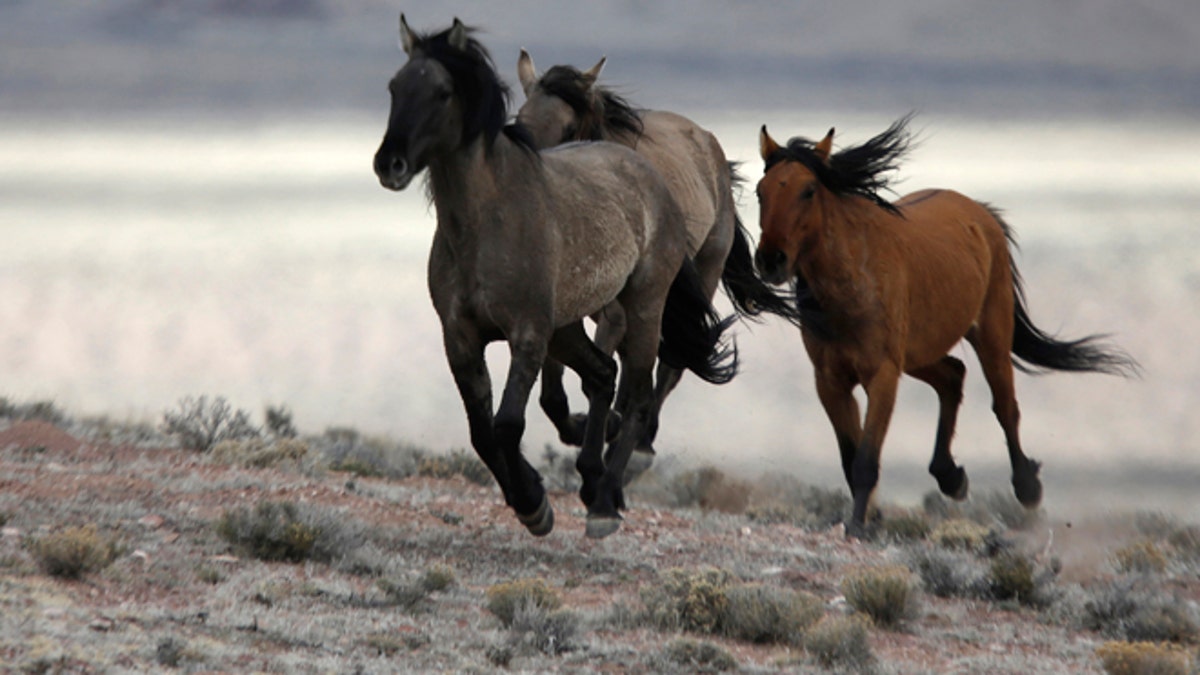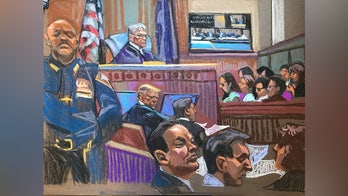
Feb. 26, 2015: Several wild horses escape the Bureau of Land Management (BLM) gather trap along Highway 21 near the Sulphur Herd Management Area south of Garrison, Utah. (Reuters)
The Bureau of Land Management (BLM) wrongly sold hundreds of federally protected wild horses to a Colorado rancher who in turn sold most the animals to be slaughtered for horse meat, according to a new watchdog report.
The U.S. Interior Department's Office of the Inspector General, which released the report Friday, concluded that the BLM did not follow the law in selling 1,794 horses to rancher Tom Davis, who reportedly has claimed to have connections to former Interior Secretary Ken Salazar. The deals were conducted through the agency’s Wild Horse and Burro Program – the program established to protect, manage and control the wild horse population.
The BLM sold horses to Davis between 2008 and 2012 for roughly $10 a horse, transactions that led the agency to lose money since they spent tens of thousands of dollars on transport. With the purchase of the animals, Davis became the largest buyer of wild horses in the United States.
Davis told investigators he then was able to sell a "load" of 35 horses for as much as $4,000, making $2,500-$3,000 profit on each sale. Despite signing a contract with the BLM agreeing not to send the horses to slaughter, he admitted to the inspector general that he sold “probably close to all of them” to Mexico to be slaughtered.
“During our investigation, Davis admitted that most of the horses that he purchased through WH&B ultimately went to slaughter. We determined that BLM did not follow current law while managing WH&B,” the report said, noting that the BLM did not follow its own policy of limiting horse sales and ensuring horses sold were not slaughtered.
The slaughter of horses for meat violated a congressional ban on the practice as well as BLM policy.
The IG office also noted that Davis had allegedly told a reporter that his family farmed land belonging to the family of former Interior Secretary Salazar and that he did “quite a bit of trucking for Ken.” A 2012 NBC News article reported the BLM began sending Davis horses just two weeks after Salazar was selected as secretary. However, Salazar denied any relationship, and the office “determined that this matter did not warrant further investigation.”
The inspector general referred the matter on the transactions with Davis to both the U.S. Attorney’s Office for the District of Colorado as well as the State of Colorado Conejos County District Attorney’s Office. Both offices chose not to proceed with either civil or criminal charges.
The report also found that the WH&B marketing specialist who approved the sales to Davis received “exceptional or superior” reviews, complete with bonuses between 2008 and 2012.
'The report paints a picture of government incompetence and a deliberate attempt to skirt the law.'
Advocates for the animals reacted furiously to the report.
“The report paints a picture of government incompetence and a deliberate attempt to skirt the law,” Suzanne Roy, director of the American Wild Horse Preservation Campaign, told FoxNews.com. "There's no justice for these horses who went to horrible brutal deaths at Mexican slaughter plants."
Roy also expressed disappointment that the agency didn't investigate the Salazar connection more thoroughly.
"This seems to have become status quo for BLM. They fervently declare and defend that they have a policy or protocol. When you bring things to the public that prove they do not follow said policy protocol they simply say 'oops, it did occur but we have done nothing wrong,'" Laura Leigh, of the Wild Horse Education blog, told FoxNews.com in an email.
“Then the agency gets offended that the public has no trust in any action they take. Until there is actual consequence, there will be no trust," Leigh said.
The BLM told FoxNews.com in a statement that the bureau takes the findings "very seriously" and has taken steps to make sure such a situation doesn't occur again.
“In response to these events, the Bureau of Land Management immediately implemented a policy to ensure that horses were sold only to good homes, including limits of four horses over a six-month period to a single buyer. This policy has helped the Bureau of Land Management avoid situations similar to those involving Mr. Davis by ensuring that purchasers provide appropriate care and facilities for the animals.” the statement read.




